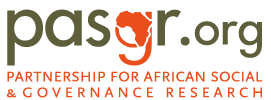Contact Info
- 6th Floor, I & M Building 2nd Ngong Avenue, Upper Hill
- +254 (0)20 2985000; +254 (0)729 111031 / +254 (0)731 000065
- info@pasgr.org
- Office Hrs: Today 9.00am to 6.00pm
Background
There is a growing discussion in the policy community about the need for sound evidence to inform policymaking with varied terminologies and concepts. However, in most parts of Africa, the policymaking process is largely dominated by contextual forces such as politics, ideology, budgetary, and resource availability, as opposed to the best available evidence. Policymakers often rely on values, experience, and political expediency without recourse to evidence, resulting in a mismatch between evidence-informed policymaking and actual evidence use in policymaking, leading to weak or inadequate policy uptake. Defining policy cultures has become the challenge of an emergent subset of public policy, namely, the politics and analysis of problem definition. It deals with ‘‘what we choose to identify as public issues and how we think and talk about these concerns.”. In summary, there is no known dominant policy culture that can be relied upon by policymakers to solve a particular policy issue.
Given this reality, PASGR commissioned a two-phase study to explore the policy culture as it exists and is practiced in specific sectors around which it has organized Utafiti Sera House. The first phase of the study explored the method that would be used in policy culture studies. The study also examined common practices and trends characterising policy making practices in housing (slum upgrading in Kenya), urbanization and housing in Rwanda, electricity in Nigeria, and the disconnect between the research process and policy making that hinders the uptake of evidence in policy making.
Building on the findings from Phase I, PASGR is designing a more comprehensive policy cultures study to document the dominant policy cultures in the policy-making processes in Africa. As a result, PASGR is inviting proposals from qualified experts in public policy and governance to conduct this study (rapid research-to-policy study) to examine the nature of policy cultures in the policy-making process across selected three African countries (Kenya, Rwanda, and Nigeria) where PASGR’s Utafiti Sera houses operate. In so doing, the study also aims to unpack the opportunities and constraints to evidence uptake in policy making.
Details are contained in the Request for Proposals.
Application Process: Interested consultants are invited to submit their technical and financial proposals in English. Applications should include:
Technical proposal:
Financial Proposal:
Interested and eligible candidates or firms are requested to submit their application with the subject clearly indicating “Rapid Research-to-Policy Study” no later than February 7, 2025, at 5:00 pm EAT, to bids@pasgr.org and cc research@pasgr.org.
For any inquiries and questions related to the call, kindly write to research@pasgr.org. Any form of canvassing will lead to automatic disqualification.
A4EA AAU advanced research design African universities agriculture Applied Quantitative Methods APSP ARD CABE call for applications cash transfers COVID-19 employment energy EOI Featured higher education IDS INCLUDE Job opportunity LEAP Africa MMRC MRPP opportunities opportunity PAMOJA TRUST partnerships PASGR PDT pedagogy PedaL press release professional development and training professional training public policy Research research methods scholarships social protection Social sciences University of Ibadan University of Pretoria utafiti sera vacancy Youth employment

6th Floor, I & M Building
2nd Ngong Avenue, Upper Hill
P.O. Box 76418-00508
Nairobi, Kenya
Email: info@pasgr.org
Tel: +254 (0)20 2985000;
+254 (0)729 111031 / +254 (0)731 000065
Legal counsel provided by Hurwit & Associates and Muthoga Gaturu & Co. Advocates
